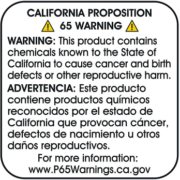Proposition 65
Regulations Involved
California’s Proposition 65 (aka Prop 65) is officially known as the Safe Drinking Water and Toxic Enforcement Act of 1986. The Proposition 65 list consists of more than 800 chemicals known to the state of California to cause cancer, birth defects, or other reproductive harm (OEHHA Updated List). This regulation requires that Californians be informed about possible exposure to chemicals on the Prop 65 list and protects California’s drinking water.
These regulations were implemented in 1986, and the Prop 65 list was first published in 1987. The Prop 65 list is required to be update at least once annually. These regulations were created to address concerns regarding exposure to toxic chemicals and contamination of drinking water.
These regulations apply to products sold in the state of California and the businesses which operate in the state.
Who Does This Apply To?
Prop 65 applies exclusively to products sold in the USA state of California. It pertains to a wide variety of products including but not limited to: alcoholic beverages, diesel engine exhaust, food, furniture products, passenger and off-highway vehicles, recreational vessels, and wood dust.
Is This Regulation Mandatory?
These regulations are mandatory for companies based in or doing business in California. Companies must provide a “clear and reasonable” warning prior to knowingly and intentionally exposing people to a Prop 65 listed chemical. Once a chemical is added to the Prop 65 list, businesses must adhere to the warning requirements by the end of a 12-month period.
Under Prop 65, businesses are also prevented from knowingly contaminating drinking water sources with Prop 65 chemicals. Businesses have 20 months to comply with the law once a chemical has been added to the Prop 65 list.
Government agencies and companies with less than 10 employees are exempt from this act.
Businesses are also exempt if the Prop 65 chemical exposure is proven to be so low as to create no significant health risk. No significant risk levels and safe harbor levels established by the OEHHA (California Office of Environmental Health Hazard Assessment) help to determine this exemption. These levels differ according to health hazard (cancer vs. reproductive harm) and per individual chemical.
For more information, see the “No Significant Risk Levels & Maximum Allowable Dose Levels”
What are the risks if a company chooses not to comply?
The Prop 65 regulations are enforced by the California Attorney General’s Office. They can be enforced by any district attorney, or city attorney (for cities with a population exceeding 750,000). Individuals can also file lawsuits against businesses which are not complying with these regulations. Fines for failing to comply with Proposition 65 can be up to $2,500 per violation per day.
How Can Nexreg Ensure Your Compliance?
Nexreg will check your product formula against the Proposition 65 list. We will generate a Prop 65 Label Memo for your product outlining all Prop 65 chemicals present and the health hazards they pose. The Memo will indicate the exact wording necessary for your label, including both the short/truncated and long/full versions. If there are no Prop 65 chemicals in the product then Nexreg will include a statement indicating as such for your internal and supply chain reference.





 Some furniture products can expose you to chemicals known to the State of California to cause cancer and/or birth defects or other reproductive harm.
Some furniture products can expose you to chemicals known to the State of California to cause cancer and/or birth defects or other reproductive harm.

